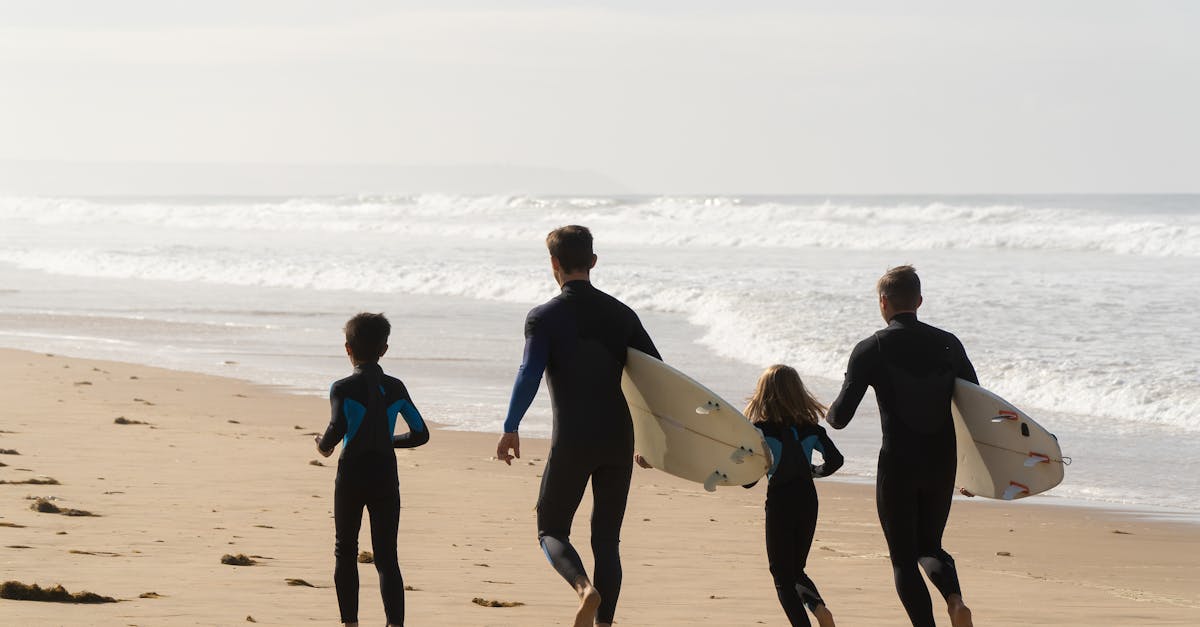Why Choose a Family Surf Camp?
Family surf camps are more than just a thrilling way to enjoy the ocean. They offer a bonding experience like no other. Picture this: your little one laughing as they catch their first wave, with you paddling alongside. It’s magical!
Surfing schools teach not only surfing skills but also respect for the ocean and safety measures. For families, they provide a supportive environment to learn at your own pace. Plus, you’ll make unforgettable memories. Consider it a trip where lessons extend beyond the waves.
With instructors experienced in working with children and adults, everyone gets a chance to learn and grow.

Finding the Perfect School: What to Look For
Not all surfing schools are created equal, especially when kids are involved. Start with location—beaches perfect for beginners are ideal.
Consider the following factors when selecting a surfing school:
- Class Sizes: Look for schools offering small class sizes. This ensures personalized instruction, facilitating quicker learning.
- Instructor Experience: Check if the instructors have experience teaching families and if they’re certified.
- Reviews: Reviews are your best friend here. Search local mom groups online or check review sites to see what others are saying.
- Flexible Packages: Finally, do they offer flexible packages? Kids’ attention spans can be as short as a goldfish’s memory, so opt for schools that offer half-day options or let you mix surf time with other activities.

Gearing Up: What You Need to Pack
Packing for a surfing trip might seem daunting, but worry not. First, check if the school provides gear. Many offer wetsuits and boards. If not, you’ll need to pack them.
Important items to remember:
- Sunscreen: The sun can be brutal!
- Rash Guards: They protect from surfboard rashes and sunburn.
- Quick-dry Towels: Essential for drying off quickly.
- Extra Swimwear: Always good to have a fresh set.
- Snacks: Lifesavers, as surfing builds up an appetite!
On a personal note, snacks kept my kids from turning into tiny hangry monsters. And don’t forget a good book or two for some beachside relaxation while your mini surfers are at it.

Overcoming Fears: Emotional Challenges and Support
Getting into the water can be intimidating. Fears are normal, especially for beginners. Kids might feel scared facing the vast ocean for the first time. Talk through these feelings, providing a sense of safety and encouragement.
Share stories of your surfing mishaps—like the time I faceplanted spectacularly, much to my family’s amusement. Normalizing these fears can be reassuring.
Specialized Classes and Support
Many schools now offer specialized classes that focus on overcoming these emotional challenges. Instructors often use games to introduce kids to water, making the learning process less daunting.
Key Takeaways
- It’s okay to be afraid;
- It’s not okay to let it hold you back.

Making It Fun: Tips for Engaging Kids
Keeping kids engaged can sometimes feel like trying to catch a wave on a board without fins. However, surfing naturally lends itself to fun! Focus on making things playful.
Many camps incorporate beach games into their lessons to maintain interest and energy. Here are some ideas to enhance the experience:
- Family Competitions: Create challenges such as who can stand up on their board the longest or who can catch the most waves. Kids love friendly rivalries!
- Encourage Teaching: Involve kids in the learning process by encouraging them to teach you a trick they’ve picked up. Their enthusiasm is contagious and can make the entire experience enjoyable for everyone involved.
Making surfing a fun and engaging activity helps foster a love for the sport among kids and creates lasting memories!

Stay Safe: Surfing with Little Ones
Safety comes first, ask any parent. Surfing with kids requires additional precautions. Begin with beach safety:
- Always surf in designated areas with lifeguards present.
- Make sure everyone wears a properly fitted life jacket, especially for younger children.
- Teach kids the importance of staying close to the shore and within view.
When it comes to surfing itself:
- Only attempt waves appropriate for your skill levels.
- Keep the sessions short—better to leave kids wanting more than exhausted.
A personal tip: Have your kids carry a whistle. It can be a simple tool for immediate attention if they feel overwhelmed or need help urgently.

